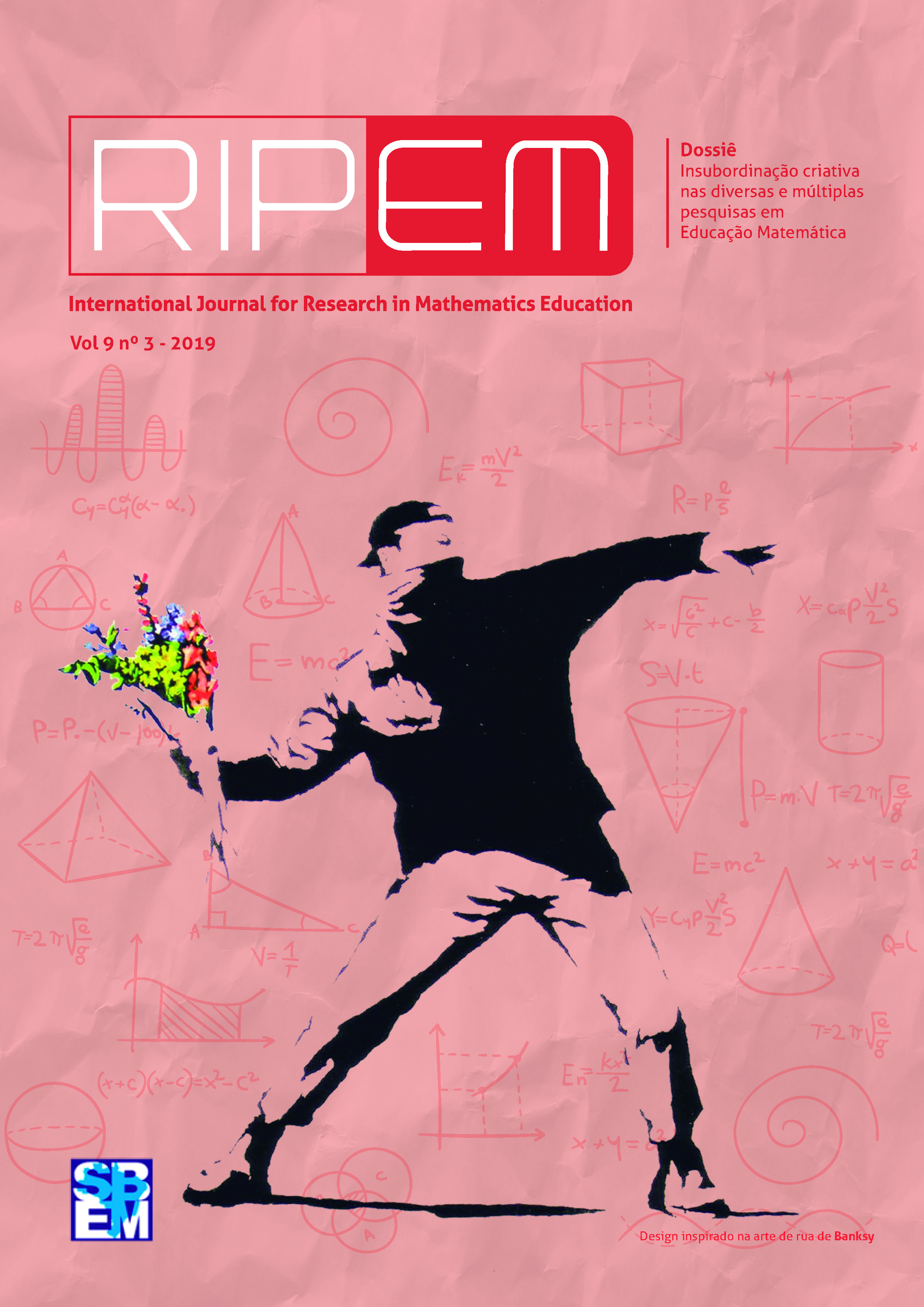Cartographic movements: acts of creative insubordination emerging in teachers’ work
DOI:
https://doi.org/10.37001/ripem.v9i3.2201Keywords:
Mathematics Education, Creative Insubordination, Cartography, Elementary School, TeachingAbstract
This work follows the production of the subjectivity of a Mathematics teacher who challenges herself to assume the position of cartographer when looking at her teaching practice and interweaving it the perception of 40 students of the 6th grade of Elementary School in relation to the Mathematics class. The flow of living in search of the construction of a specific reality that answers the question: ‘how do pedagogical propositions as a constituent part of the machinery of living, enable students to build understandings about the mathematics class as a space for collective living?’ was unable to answer this question. However, by making cartographic movements to accompany this production, multiple acts of Creative Insubordination emerged. Thus, it was possible to conclude that Creative Insubordination tends to be an educational movement capable of transforming the understanding about the educational process. This is because it is believed that conscious subversive actions that take place in the midst of experience transform teaching into a way to make teachers aware of the school community to which they are inserted and make school spaces humanized environments.
Downloads
References
Camargo, B. V. & Justo, A. M. (2013). IRAMUTEQ: um software gratuito para análise de dados textuais. Temas em Psicologia, Ribeirão Preto, 21, 2, 513-518.
Damásio, A. (2012). O erro de Descartes: emoção, razão e o cérebro humano (3ª ed.). São Paulo: Companhia das Letras.
D'Ambrosio, B. (2015). A subversão responsável na constituição do educador matemático. En G. Obando (ed). 16º Encuentro Colombiano de Matemática Educativa. Bogotá. CO: Asociación Colombiana de Matemática Educativa, 1-8.
D'Ambrosio, B & Lopes, C. (2015). Insubordinação Criativa: um convite à reinvenção do educador matemático. Bolema, Rio Claro, 29, 51, 1-17.
Guattari, F. & Rolnik, S. (1996). MicropolÃtica: cartografias do desejo. Rio de Janeiro: Vozes.
Maturana, H. (2014). Cognição, Ciência e Vida Cotidiana (2ª ed.). Belo Horizonte: Editora UFMG.
Maturana, H. (2005). Emoções e linguagem na educação e na polÃtica. Editora UFMG - Belo Horizonte.
Maturana, H & Varela F. (2011). A Ãrvore do conhecimento: as bases biológicas do entendimento humano (9ª ed.). São Paulo: Palas Athena.
Maturana, H & Verden-Zöller. G. (2004). Amar e Brincar: fundamentos esquecidos do humano do patriarcado à democracia. São Paulo: Palas Athena.
Maturana, H & DÃvila, X. P. (2006). Educação a partir da matriz biológica da existência humana. Revista PRELAC, 2, 30-39.
Nóvoa, A. (2017). Firmar a posição como professor, afirmar a profissão docente. Cadernos de Pesquisa [online], 47, 166, 1106-1133.
Oliveira, T. & Paraiso, M. (2012). Mapas, dança, desenhos: a cartografia como método de pesquisa em educação. Pro-Posições, 23, 3, 69, 159-178.
Pozzana, L. (2013). A formação do cartógrafo é o mundo: corporificação e afetabilidade. Fractal, 25, 2, 323-338.
Rolnik, S. (2007). Cartografia Sentimental: transformações contemporâneas do desejo. Porto Alegre: Sulina; Editora da UFRGS.
Tardif, M. (2010). Saberes docentes e formação profissional (11ª ed.). Petrópolis: Vozes.
Tardif, M & Raymond, D. (2000). Saberes, tempo e aprendizagem do trabalho no magistério. Educação & Sociedade [online], 21, 73, 209-244.
Published
How to Cite
Issue
Section

This work is licensed under a Creative Commons Attribution-NonCommercial-NoDerivatives 4.0 International License.








